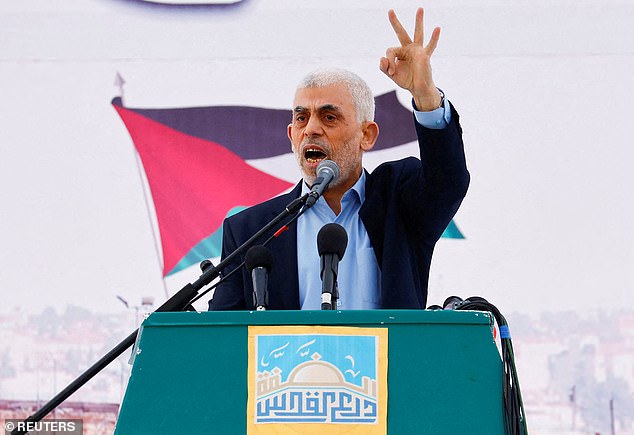Hamas commanders planned to invade all of Israel and divide it among the group’s leaders, killing settlers and integrating others into a Palestinian state, according to a former West Bank official.
A former high-ranking official of Fatah, a political organization of Palestinian Arabs, told Israeli media. Haaretz that Hamas had been planning to “take down Israel” for a long time, even going so far as to divide the territory into cantons.
“One day, a well-known Hamas figure calls me and tells me with pride and joy that they are preparing a complete list of committee heads for the cantons to be created in Palestine,” Iyad (not his real name) told the outlet. .
Iyad claimed that he did not take the conversation about “the last promise” seriously until 2021, when he realized that “the entire leadership had been taken captive by the [Hamas leader, Yahya] The Sinwar group’s deranged idea of an all-out battle,” according to Israeli journalist Shlomi Eldar.
“They believed so strongly in the idea that Allah was with them and that they were going to overthrow Israel, that they started dividing Israel into cantons, for the day after the conquest,” he said, calling Sinwar a “crazy fanatic.” ‘.
Yahya Al-Sinwar, head of the Palestinian Islamist movement Hamas in the Gaza Strip, speaks during a rally to mark the annual Al-Quds Day, in Gaza, April 14, 2023.
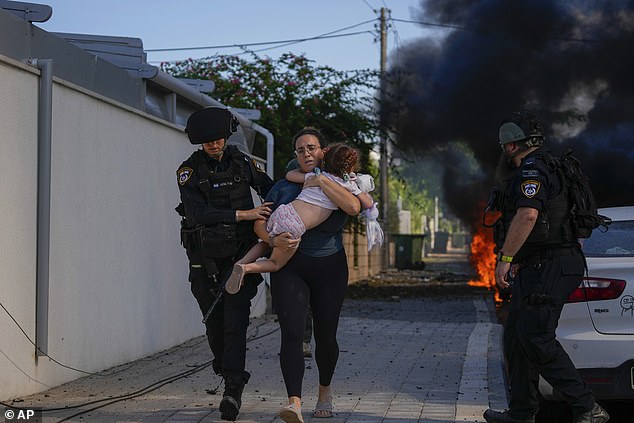
Israeli police officers evacuate a woman and a child from a site hit by a rocket fired from the Gaza Strip, in Ashkelon, southern Israel, Saturday, October 7, 2023.

People flee following Israeli airstrikes on a neighborhood of the al-Maghazi refugee camp in the central Gaza Strip on November 6, 2023.
Iyad told the outlet that he was offered the chairmanship of the Zarnuqa committee after the planned invasion, “where my family lived before 1948.”
He claimed to have rejected the offer to “lead the group that would be responsible for rehabilitating the Ramle-Rehovot area” currently in the region “the day after the realization of “the last promise.”
“You’re crazy,” Iyad said he told the Hamas official, asking them not to contact him again.
That year, Sinwar sent a letter speech to the Hamas-sponsored “Conference on the Promise of the Hereafter,” attended by other Palestinian groups, exploring preparations for the future administration of a larger Palestinian state after Israel “disappears.”
The Hamas leader said at the time that the conquest of the “State of the Zionists” was “closer now than ever,” reiterating efforts to achieve Hamas’ “strategic vision” and plans for “what comes next.”
Among the reported plans was an independence document that would be “a direct continuation of the Pact of “Umar Bin Al-Khattab” concerning the surrender of Byzantine Jerusalem to Muslim conquerors which apparently took place in 638″, a new currency and a call for guidance on resettling refugees who wish to return.
The conference also recommended rules for dealing with the Jewish population, including defining who would be killed, who would be prosecuted, and who would be allowed to leave or remain and integrate into a new state, according to the American research institute. MEMRI.
The conference also discussed the risk of a brain drain and how to ensure that “educated Jews skilled in the areas of medicine, engineering, technology, and civil and military industry” stay, preventing them from leaving.
Sinwar said at the time that Hamas was sponsoring this conference because it is in line with our assessment that victory is near and that “the full liberation of Palestine from the sea to the river” is “the heart of Hamas’s strategic vision.”
Hamas, formed in 1987 by members of the Muslim Brotherhood, has controlled the Gaza Strip since winning parliamentary elections in 2006 and toppling the rival Fatah party in a power struggle during the bloody Battle of Gaza in 2007.
Fatah, the largest faction of the multi-party Palestine Liberation Organization (PLO), retained control of the Palestinian National Authority in the West Bank through its president and oversees several Palestinian refugee camps.
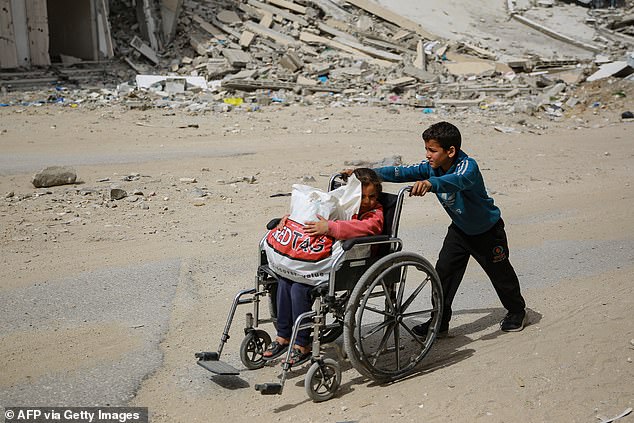
A boy pushes a girl in a wheelchair in front of a destroyed building in Gaza City on March 28.
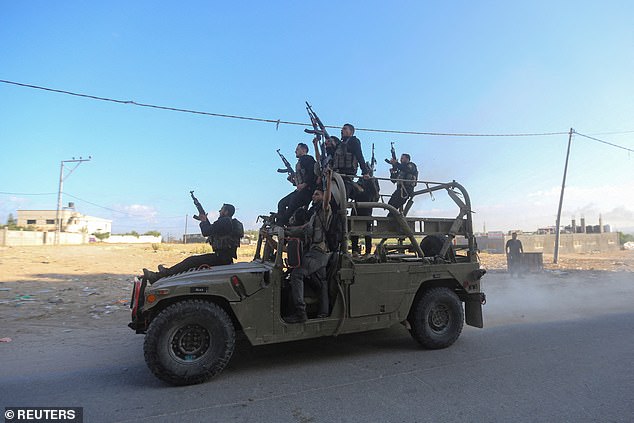
Palestinian militants ride in an Israeli military vehicle that was seized by gunmen who infiltrated areas of southern Israel, northern Gaza Strip, October 7, 2023.
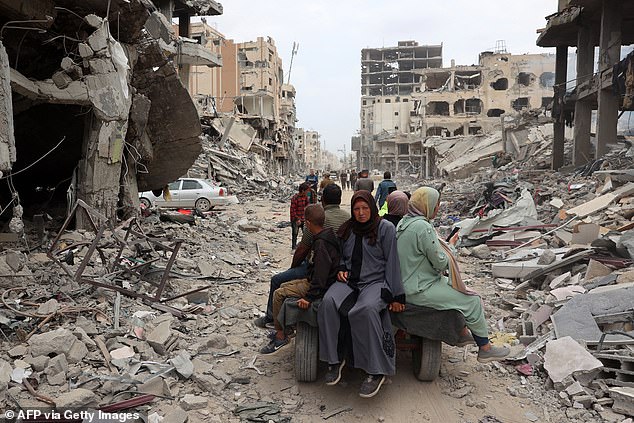
A Palestinian family rides on the back of a donkey-drawn carriage next to damaged buildings in Khan Yunis on April 8, 2024.
Since the Battle of Gaza, Hamas has made several attempts at reconciliation with Fatah, without a lasting agreement.
Hamas usurped interim authorities in Gaza in 2006 in a campaign against corruption and vowing to take back land taken from Israel since the latter’s founding in 1948. they have not held elections Since then.
They also gained support in their promises to resettle Palestinians displaced from their lands and property by a series of large massacres during the 1948 war, in which some 700,000 Palestinians fled or were expelled from their homes and some 700,000 Palestinians fled or were expelled from their homes. They were driven from their homes. 15,000 They were killed in mass atrocities.
While Fatah, a secular organization seeking to build a Palestinian state on the 1967 borders, carried out thousands of guerrilla attacks against Israel, the group has worked more to negotiate with Israel in recent years. discarded armed resistance.
However, this remains controversial, as Israel has been granted full control of the Palestinian economy and security issues in more than 60 percent of the West Bank.
Hamas, an Islamist organization that does not recognize Israel but apparently accepts a Palestinian state with 1967 borders, remains divisive for its continued use of armed resistance in its efforts to – in its view – reclaim Palestinian lands.
The group staged its first suicide bombing in 1993, destroying a bus in the West Bank carrying Israeli soldiers, killing the attacker and a Palestinian working nearby.
Hamas constantly refined its techniques and engaged in retaliatory attacks against Israel during periods of conflict.
Perceived resistance earned the group support among Palestinians in Gaza, although Fatah would remain more popular into the 21st century.
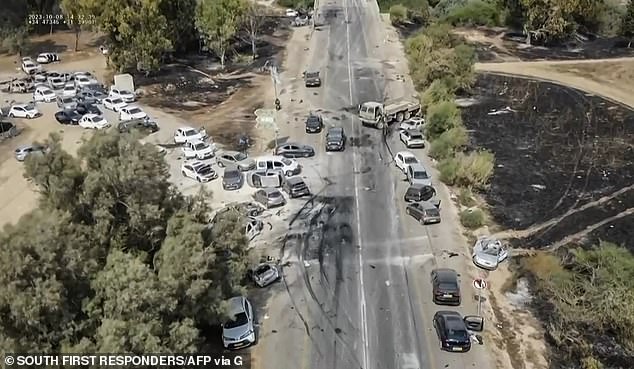
Terrifying images show cars abandoned after the October 7 attacks in southern Israel, near Kibbutz Re’im.
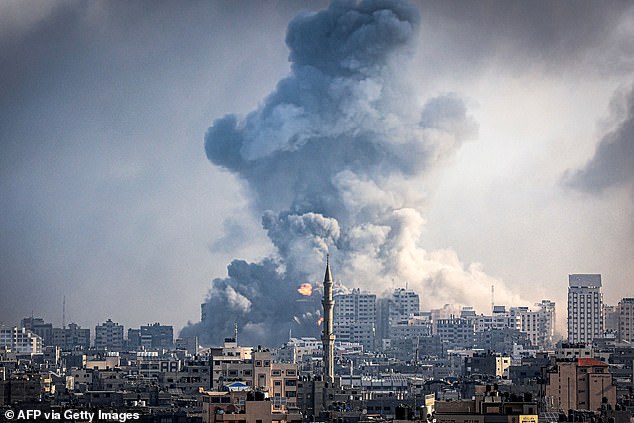
Plumes of smoke rise during Israeli airstrikes on Gaza City on October 12, 2023.
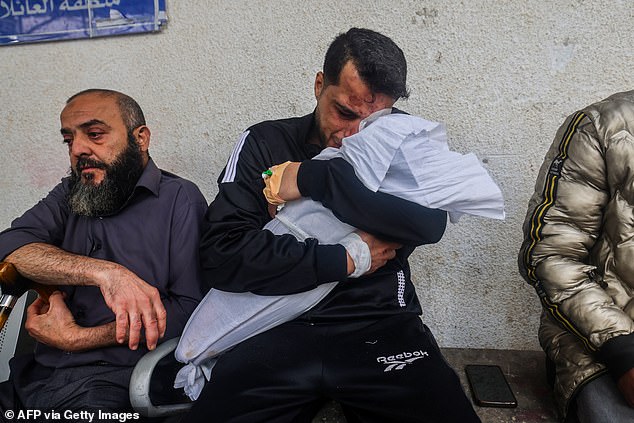
Palestinian father Ashraf cries as he holds the body of one of his two daughters after they were both killed in an overnight Israeli airstrike in Rafah, southern Gaza Strip, April 4, 2024.
TO survey of Palestinians in the West Bank and Gaza late last year, after the October 7 attack, found a surge in support for Hamas despite the devastation of the Gaza Strip.
The survey found that 63 percent also believed that “armed struggle” was the most effective strategy for achieving independence – an increase of ten percent in three months.
Only 13 percent favored nonviolent protests and 20 percent favored negotiations with Israel. Support for Hamas rises in times of conflict and falls in times of peace, pollsters say.
Nearly 90 percent also believed that Western-backed President Mahmoud Abbas, head of the ANP and chairman of the PLO, should resign.
The narrative around the war is somewhat complicated by access to information.
While nearly 80 percent of Palestinians oppose the killing of Israeli civilians and taking hostages, 85 percent saying They have not seen images of the atrocities committed by Hamas against civilians on October 7.


